Navigating the Aftermath: A Journey Through Post-Trauma Life Introduction In the labyrinthine tapestry of human experience, trauma weaves a somber thread, leaving an enduring mark on the psyche and the soul. Its tendrils reach far and wide, ensnaring countless individuals within its clutches, leaving behind an invisible yet profound aftermath. As we navigate the intricate complexities of post-trauma life, it becomes imperative to embark on a multifaceted journey of healing, growth, and resilience. This essay delves into the profound impact of trauma, explores the indispensable role of professional help, unravels the myriad coping mechanisms that can alleviate suffering, and illuminates the path towards fostering resilience. The impact of trauma is as diverse as the individuals who experience it. The psychological effects, often insidious and debilitating, can manifest in a myriad of forms. Post-traumatic stress disorder (PTSD), a haunting legacy of trauma, can torment victims with recurrent nightmares, intrusive memories, and an unrelenting sense of hypervigilance. Depression, with its suffocating grip on the mind, can drain the very lifeblood of hope and motivation. Anxiety, a constant companion, can paralyze the body and mind, casting a long and oppressive shadow over daily life. Memory impairment, a cruel theft of the past, can leave victims struggling to piece together the fragmented shards of their experiences. Trauma's physical manifestations are no less devastating. Chronic pain, a relentless torment, can sap the body of its vigor and vitality. Sleep disturbances, like an elusive dream, can shatter the restorative embrace of slumber, leaving individuals perpetually exhausted and drained. Gastrointestinal issues, a physical manifestation of emotional turmoil, can inflict a relentless barrage of discomfort and pain. These myriad effects, both psychological and physical, paint a grim portrait of the devastating toll that trauma can wreak upon the human body. The emotional toll of trauma is equally profound, leaving victims grappling with an array of overwhelming feelings. Shame, a corrosive poison, can eat away at the very core of one's selfworth. Guilt, a relentless tormentor, can relentlessly berate the soul with self-blame and doubt. Anger, a fiery inferno, can consume victims, leaving them consumed by rage and bitterness. Grief, a poignant tapestry of sorrow and loss, can linger long after the initial trauma, casting a pall over the present and obscuring the path forward. These emotional

and seemingly insurmountable task. Seeking Professional Help In the aftermath of trauma, seeking professional help is an indispensable step towards healing and recovery. A therapist or counselor provides a safe and confidential space where individuals can confront their trauma experiences, explore their emotions, and develop coping mechanisms. Trauma-informed therapists possess specialized knowledge and training in understanding the unique challenges faced by trauma survivors and can offer tailored support and guidance. Therapy can take various forms, each with its own strengths and approaches. Cognitive Behavioral Therapy (CBT) focuses on identifying and challenging negative thought patterns and behaviors that contribute to post-traumatic distress. Trauma-Focused Therapy delves directly into the traumatic memories and experiences, helping individuals process and integrate them into their narratives. Eye Movement Desensitization and Reprocessing (EMDR) utilizes bilateral stimulation to facilitate the processing of traumatic memories and reduce their emotional impact. Finding the right therapist is crucial for successful therapeutic outcomes. Seeking referrals from trusted sources, such as healthcare providers or crisis hotlines, can be a helpful starting point. It is important to consider factors such as the therapist's experience and expertise in treating trauma, their theoretical orientation, and their personal qualities. A good fit between the therapist and the individual is essential for building a strong therapeutic relationship and maximizing the benefits of therapy. By engaging in therapy, trauma survivors can embark on a journey of healing and growth. With the support of a skilled therapist, they can gain insights into their trauma experiences, develop coping mechanisms, and cultivate resilience. Therapy provides a safe haven where individuals can confront their fears, process their pain, and begin to rebuild their lives after the devastation of trauma. Implementing Coping Mechanisms In the arduous journey of navigating post-trauma life, implementing effective coping mechanisms is paramount to alleviating suffering, regaining a sense of control, and fostering resilience. Self-care techniques, social support, and creative expression emerge as invaluable tools in the arsenal of coping strategies.
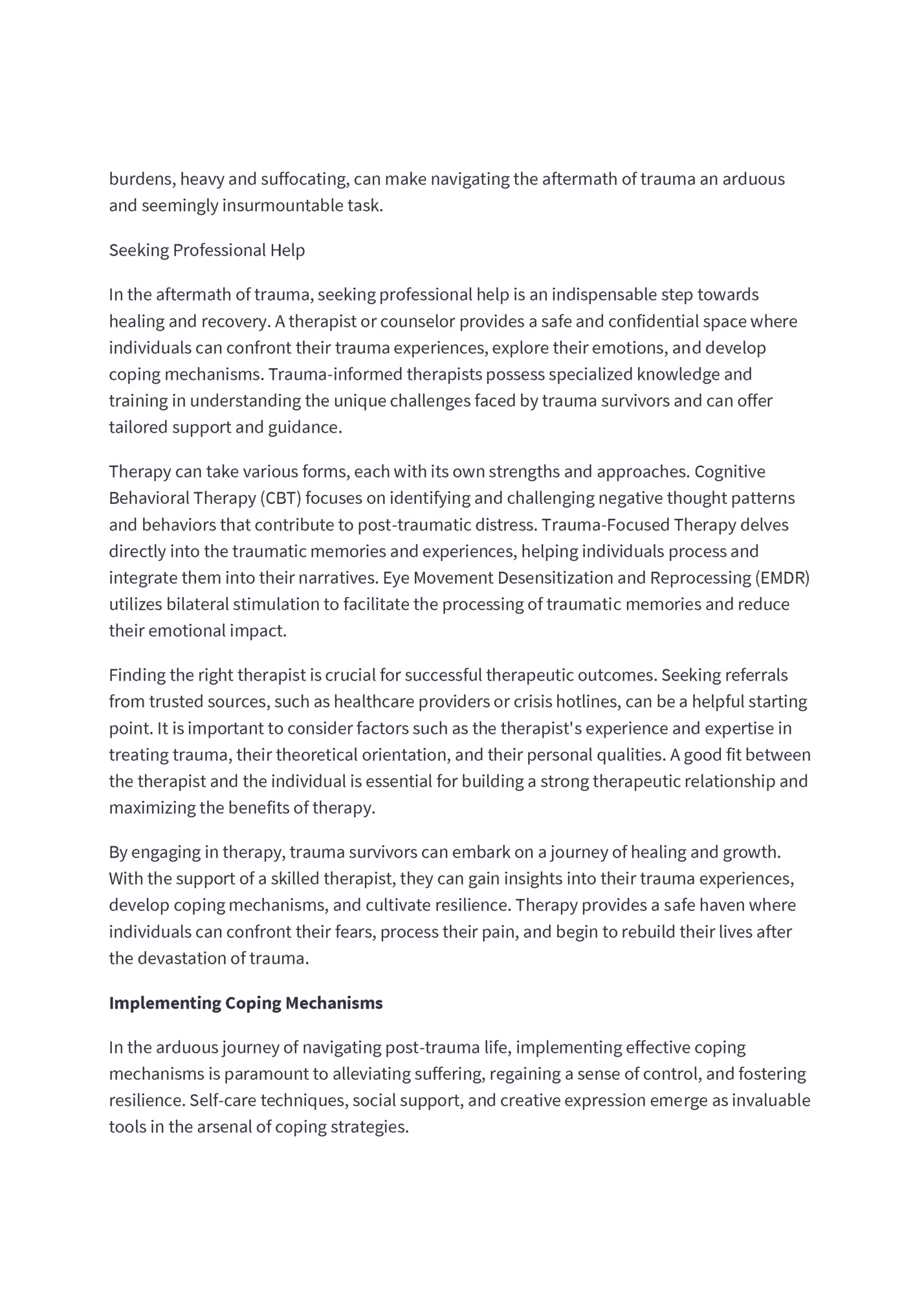
Self-care, a holistic approach to nurturing one's physical, emotional, and mental well-being, plays a pivotal role in coping with the multifaceted effects of trauma. Mindfulness, a practice of intentionally directing attention to the present moment without judgment, has been shown to reduce stress, improve emotional regulation, and enhance overall well-being. Meditation, a contemplative practice that cultivates inner peace and clarity, can provide a refuge from the intrusive thoughts and overwhelming emotions that often accompany trauma. Yoga, an ancient practice that combines physical postures, breathing exercises, and meditation, has been found to alleviate anxiety, improve sleep quality, and reduce chronic pain. Spending time in nature, immersing oneself in the tranquility of the natural world, can provide respite from the stressors of daily life and foster a sense of calm and serenity. Social Support Building a strong support system is essential for individuals navigating the aftermath of trauma. Family, friends, and support groups provide emotional and practical assistance, offering a sense of belonging, understanding, and validation. Sharing experiences with others who have endured similar traumas can foster a sense of community and reduce feelings of isolation. Support groups, led by trained facilitators, provide a safe and confidential space for individuals to connect with others who understand their struggles and offer support and encouragement. Seeking help from trusted loved ones can alleviate the burden of carrying the weight of trauma alone and promote a sense of shared responsibility and care. Creative Expression Creative activities, such as art, music, and writing, offer a powerful outlet for processing emotions, expressing trauma experiences, and fostering healing. Art therapy, a form of psychotherapy that utilizes artistic expression as a therapeutic tool, can facilitate the exploration of deep-seated emotions, promote self-discovery, and enhance coping skills. Music therapy can provide a soothing and cathartic outlet for expressing and processing trauma-related emotions. Writing, whether in the form of journaling, poetry, or storytelling, can serve as a means of documenting, reflecting upon, and giving voice to trauma experiences. Creative expression allows individuals to transcend the limitations of verbal communication and access deeper levels of self-awareness and emotional healing. Fostering Resilience
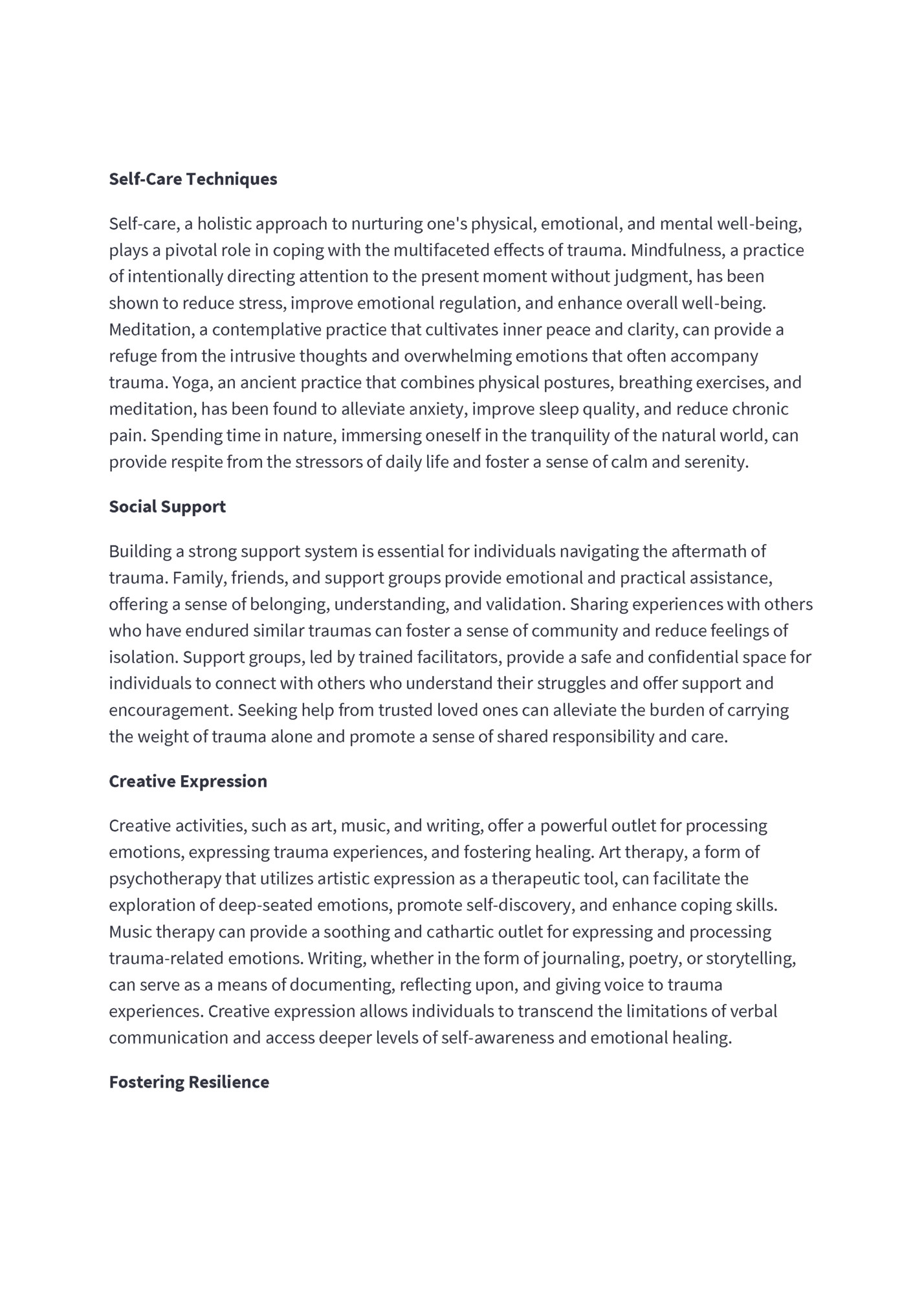
empowering individuals to rise above adversity and thrive. Resilience is not a passive quality but rather an active process that requires conscious cultivation and nurturing. It is defined as the ability to bounce back from setbacks, adapt to changing circumstances, and maintain a sense of well-being despite life's challenges. Fostering resilience is not about eliminating vulnerability but rather about developing the inner strength and resources to navigate life's inevitable storms. Definition of Resilience Resilience is a multidimensional construct that encompasses various psychological, emotional, and behavioral attributes. At its core lies the belief that individuals possess the inherent capacity to overcome challenges and adapt to adversity. Resilience is not about being impervious to pain or hardship but rather about developing the skills and mindset to navigate difficulties with grace and determination. It involves the ability to recognize and utilize one's strengths, cultivate a positive outlook, and maintain a sense of hope even in the face of setbacks. Cultivating Resilience Cultivating resilience is an ongoing process that requires consistent effort and self-reflection. Several key factors have been identified as essential for developing resilience: 1. Optimism and Hope: Resilient individuals tend to possess an optimistic outlook on life, believing in their ability to overcome challenges and create a better future. They maintain a sense of hope even in difficult times, recognizing that adversity can be a catalyst for growth and transformation. 2. Self-Compassion: Resilient individuals practice self-compassion, treating themselves with kindness and understanding, especially during times of distress. They recognize their own strengths and limitations, accepting that setbacks are a natural part of life. Self-compassion fosters a sense of self-worth and reduces the impact of negative self-talk. 3. Growth Mindset: A growth mindset is the belief that abilities and intelligence can be developed through effort and perseverance. Resilient individuals embrace challenges as opportunities for growth and
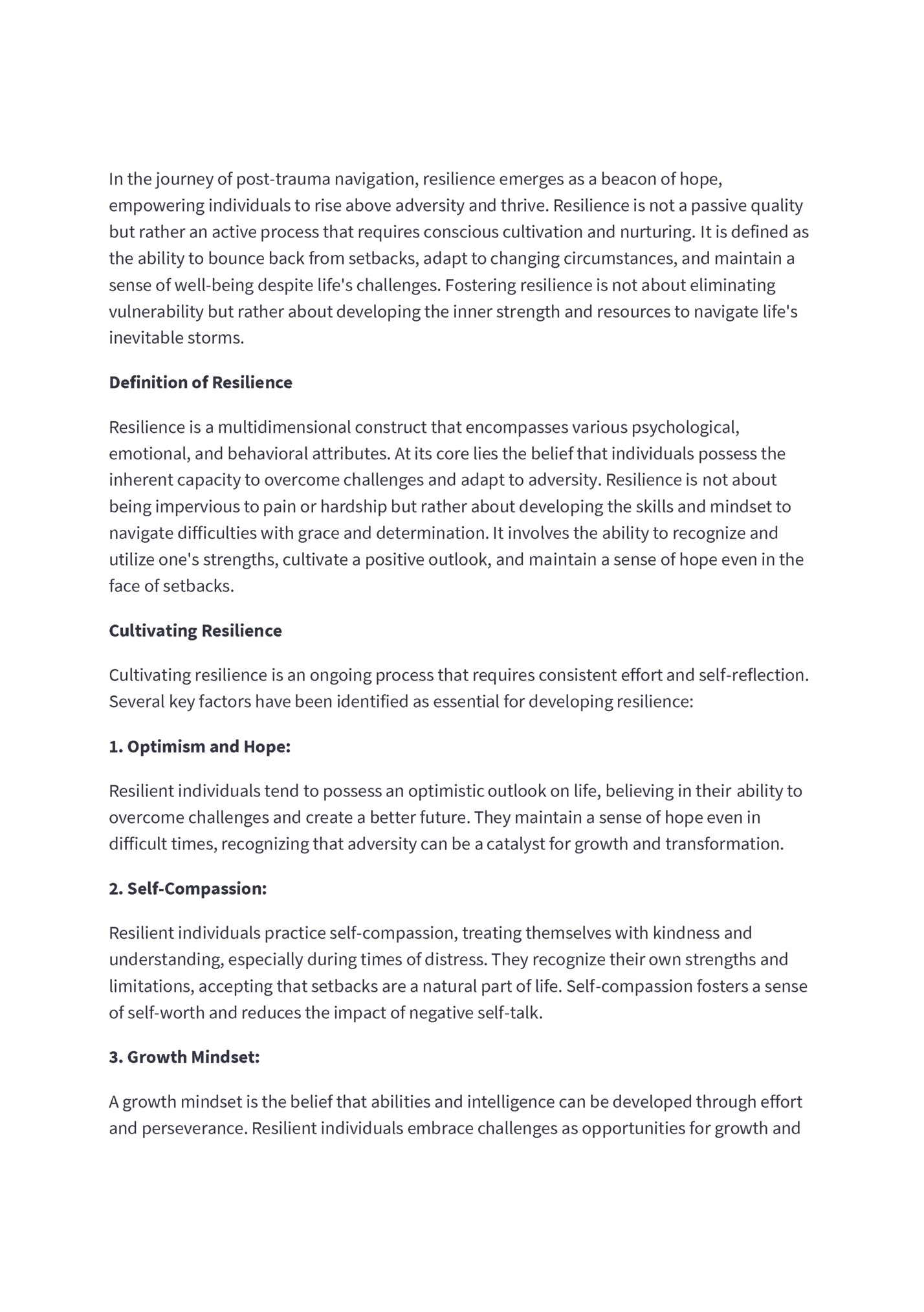
willing to take risks, experiment with new strategies, and seek feedback in order to improve their skills and abilities. 4. Meaning and Purpose: Finding meaning and purpose in life is a powerful factor in fostering resilience. Resilient individuals have a sense of direction and significance in their lives, which provides them with a sense of motivation and resilience in the face of adversity. They believe that their actions have value and contribute to something greater than themselves. 5. Seeking Support: Resilient individuals recognize the importance of seeking support from others when needed. They are not afraid to reach out to family, friends, therapists, or support groups for guidance, encouragement, and practical assistance. Strong social connections provide a sense of belonging and reduce feelings of isolation, making it easier to navigate difficult times. Seeking Meaning Finding meaning and purpose in life is a transformative force in fostering resilience. When individuals discover their unique contributions to the world, they develop a sense of significance and belonging that transcends their trauma experiences. Meaning can be found in various aspects of life, such as work, relationships, hobbies, spirituality, or volunteerism. By engaging in activities that align with their values and passions, individuals can create a fulfilling and purposeful life despite the challenges they have faced. Meaning-making can also involve reframing the trauma experience as an opportunity for growth and transformation. By seeking to understand the lessons learned from their adversity, individuals can gain a sense of empowerment and resilience. They may recognize that their struggles have made them stronger, wiser, and more compassionate towards others. In the aftermath of trauma, the journey towards healing and resilience is a complex and deeply personal one. By embracing a multifaceted approach that encompasses professional help, coping mechanisms, and the cultivation of resilience, individuals can navigate the challenges of post-trauma life with courage, determination, and an unwavering belief in their own ability to thrive.
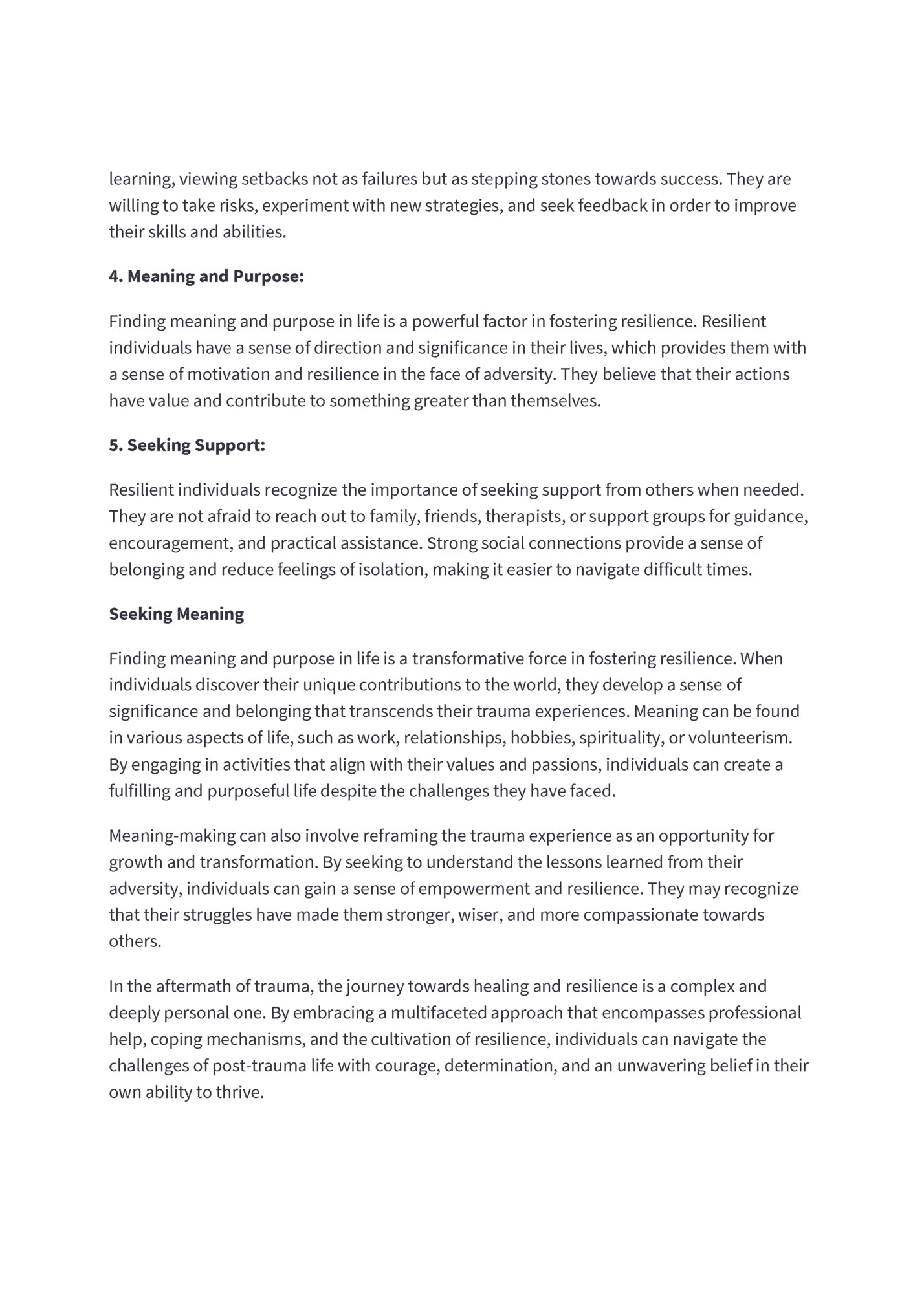
Definition of Resilience In the aftermath of trauma, fostering resilience becomes a beacon of hope, guiding individuals towards healing and thriving. Resilience is not a passive trait, but rather a dynamic process that requires conscious cultivation and nurturing. It encapsulates the ability to bounce back from adversity, adapt to changing circumstances, and maintain a sense of well-being despite life's inevitable challenges. Resilience is not about eliminating vulnerability, but rather about developing the inner strength and resources to navigate life's storms with grace and determination. Cultivating Resilience: Key Factors Fostering resilience is an ongoing journey that requires consistent effort and self-reflection. Several key factors have been identified as essential for developing resilience: 1. Optimism and Hope: Resilient individuals tend to possess an optimistic outlook on life, believing in their ability to overcome challenges and create a better future. They maintain a sense of hope even in difficult times, recognizing that adversity can be a catalyst for growth and transformation. Optimism and hope fuel resilience by providing a positive lens through which to view challenges and setbacks. By embracing a hopeful mindset, individuals can envision a future beyond their current circumstances and develop the motivation to persevere. 2. Self-Compassion: Resilient individuals practice self-compassion, treating themselves with kindness and understanding, especially during times of distress. They recognize their own strengths and limitations, accepting that setbacks are a natural part of life. Self-compassion fosters a sense of self-worth and reduces the impact of negative self-talk. By being kind to themselves, resilient individuals can maintain a positive self-image even when faced with challenges. 3. Growth Mindset: A growth mindset is the belief that abilities and intelligence can be developed through effort and perseverance. Resilient individuals embrace challenges as opportunities for growth and learning, viewing setbacks not as failures but as stepping stones towards success. They are willing to take risks, experiment with new strategies, and seek feedback in order to improve
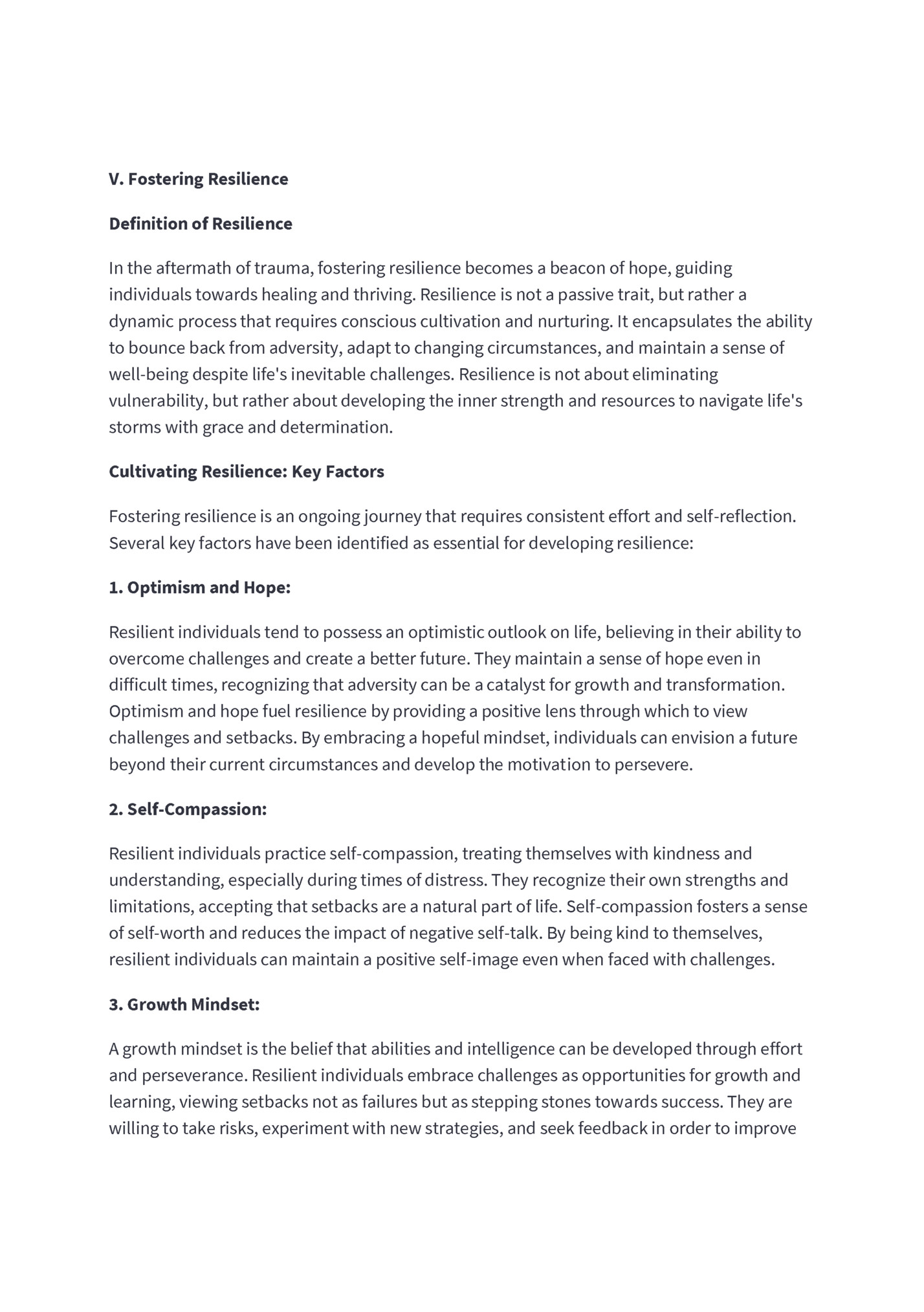
mastery and self-efficacy, which are essential foundations for resilience. 4. Meaning and Purpose: Finding meaning and purpose in life is a powerful factor in fostering resilience. Resilient individuals have a sense of direction and significance in their lives, which provides them with a sense of motivation and resilience in the face of adversity. They believe that their actions have value and contribute to something greater than themselves. By discovering their unique contributions to the world, individuals can cultivate a sense of purpose that transcends their trauma experiences and empowers them to navigate challenges with greater determination. 5. Seeking Support: Resilient individuals recognize the importance of seeking support from others when needed. They are not afraid to reach out to family, friends, therapists, or support groups for guidance, encouragement, and practical assistance. Strong social connections provide a sense of belonging and reduce feelings of isolation, making it easier to navigate difficult times. By surrounding themselves with a supportive network, resilient individuals can access valuable resources and emotional encouragement that can bolster their resilience. Seeking Meaning: Reframing Trauma as an Opportunity for Growth In the aftermath of trauma, finding meaning and purpose can be a transformative force in fostering resilience. When individuals discover their unique contributions to the world, they develop a sense of significance and belonging that transcends their trauma experiences. Meaning can be found in various aspects of life, such as work, relationships, hobbies, spirituality, or volunteerism. By engaging in activities that align with their values and passions, individuals can create a fulfilling and purposeful life despite the challenges they have faced. Meaning-making can also involve reframing the trauma experience as an opportunity for growth and transformation. By seeking to understand the lessons learned from their adversity, individuals can gain a sense of empowerment and resilience. They may recognize that their struggles have made them stronger, wiser, and more compassionate towards others. By embracing a growth mindset and seeking meaning in their experiences, individuals can transform their trauma into a catalyst for positive change and personal development.
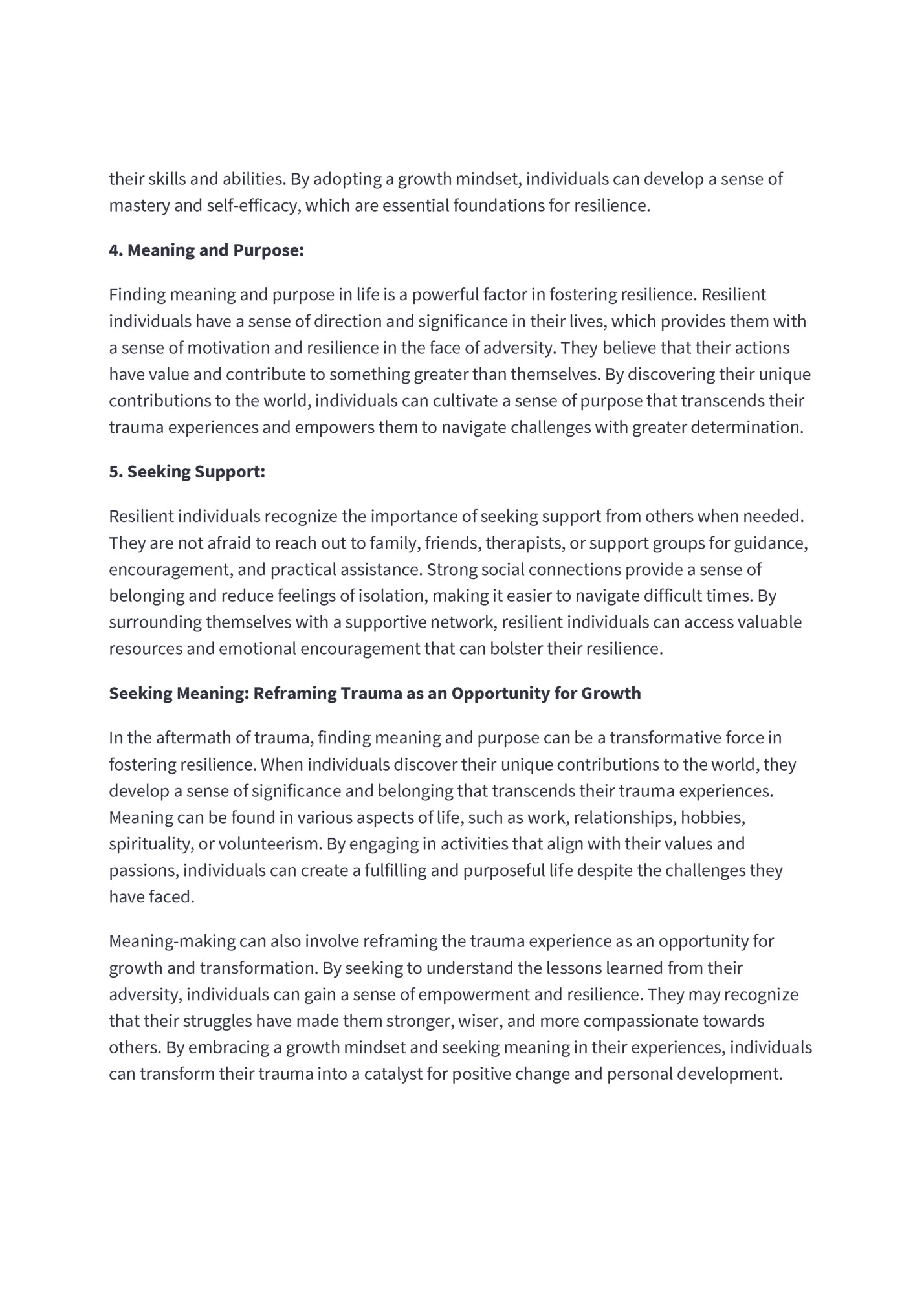
Cultivating Resilience: Key Factors In the face of adversity, cultivating resilience emerges as a beacon of hope, empowering individuals to rise above their challenges and thrive. This dynamic process requires conscious effort and self-reflection, and several key factors have been identified as essential for developing resilience: 1. Optimism and Hope: Resilient individuals possess an optimistic outlook on life, believing in their ability to overcome challenges and create a brighter future. Even in the darkest of times, they maintain a sense of hope, recognizing that adversity can be a catalyst for growth and transformation. Optimism and hope fuel resilience by providing a positive lens through which to view challenges and setbacks. By embracing a hopeful mindset, individuals can envision a future beyond their current circumstances and develop the motivation to persevere. 2. Self-Compassion: Resilient individuals practice self-compassion, treating themselves with kindness and understanding, especially during times of distress. They recognize their own strengths and limitations, accepting that setbacks are a natural part of life. Selfcompassion fosters a sense of self-worth and reduces the impact of negative self-talk. By being kind to themselves, resilient individuals can maintain a positive self-image even when faced with challenges. 3. Growth Mindset: A growth mindset is the belief that abilities and intelligence can be developed through effort and perseverance. Resilient individuals embrace challenges as opportunities for growth and learning, viewing setbacks not as failures but as stepping stones towards success. They are willing to take risks, experiment with new strategies, and seek feedback in order to improve their skills and abilities. By adopting a growth mindset, individuals can develop a sense of mastery and self-efficacy, which are essential foundations for resilience. 4. Meaning and Purpose: Finding meaning and purpose in life is a powerful factor in fostering resilience. Resilient individuals have a sense of direction and significance in their lives, which provides them with a sense of motivation and resilience in the face of adversity. They believe that their actions have value and contribute to something greater than themselves. By discovering their unique contributions to the world, individuals can cultivate a sense of purpose that transcends their trauma experiences and empowers them to navigate challenges with greater determination. 5. Seeking Support: Resilient individuals recognize the importance of seeking support from others when needed. They are not afraid to reach out to family, friends, therapists, or
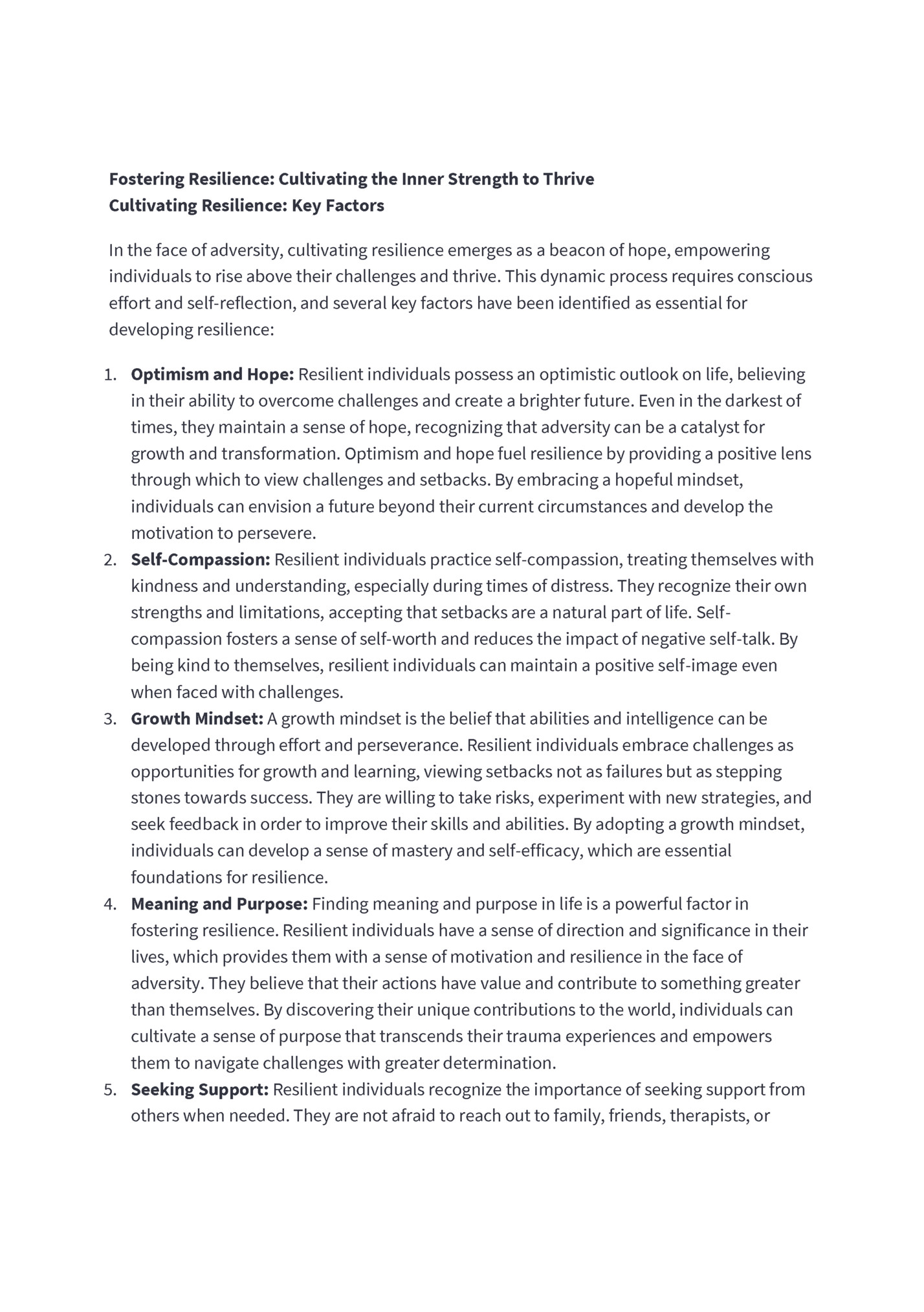
connections provide a sense of belonging and reduce feelings of isolation, making it easier to navigate difficult times. By surrounding themselves with a supportive network, resilient individuals can access valuable resources and emotional encouragement that can bolster their resilience. Seeking Meaning: Reframing Trauma as an Opportunity for Growth In the aftermath of trauma, finding meaning and purpose can be a transformative force in fostering resilience. When individuals discover their unique contributions to the world, they develop a sense of significance and belonging that transcends their trauma experiences. Meaning can be found in various aspects of life, such as work, relationships, hobbies, spirituality, or volunteerism. By engaging in activities that align with their values and passions, individuals can create a fulfilling and purposeful life despite the challenges they have faced. Meaning-making can also involve reframing the trauma experience as an opportunity for growth and transformation. By seeking to understand the lessons learned from their adversity, individuals can gain a sense of empowerment and resilience. V. Fostering Resilience Cultivating Resilience: Key Factors In the face of adversity, cultivating resilience emerges as a beacon of hope, empowering individuals to rise above their challenges and thrive. This dynamic process requires conscious effort and self-reflection, and several key factors have been identified as essential for developing resilience: 1. Optimism and Hope: Resilient individuals possess an optimistic outlook on life, believing in their ability to overcome challenges and create a brighter future. Even in the darkest of times, they maintain a sense of hope, recognizing that adversity can be a catalyst for growth and transformation. Optimism and hope fuel resilience by providing a positive lens through which to view challenges and setbacks. By embracing a hopeful mindset, individuals can envision a future beyond their current circumstances and develop the motivation to persevere. 2. Self-Compassion: Resilient individuals practice self-compassion, treating themselves with kindness and understanding, especially during times of distress. They recognize their own
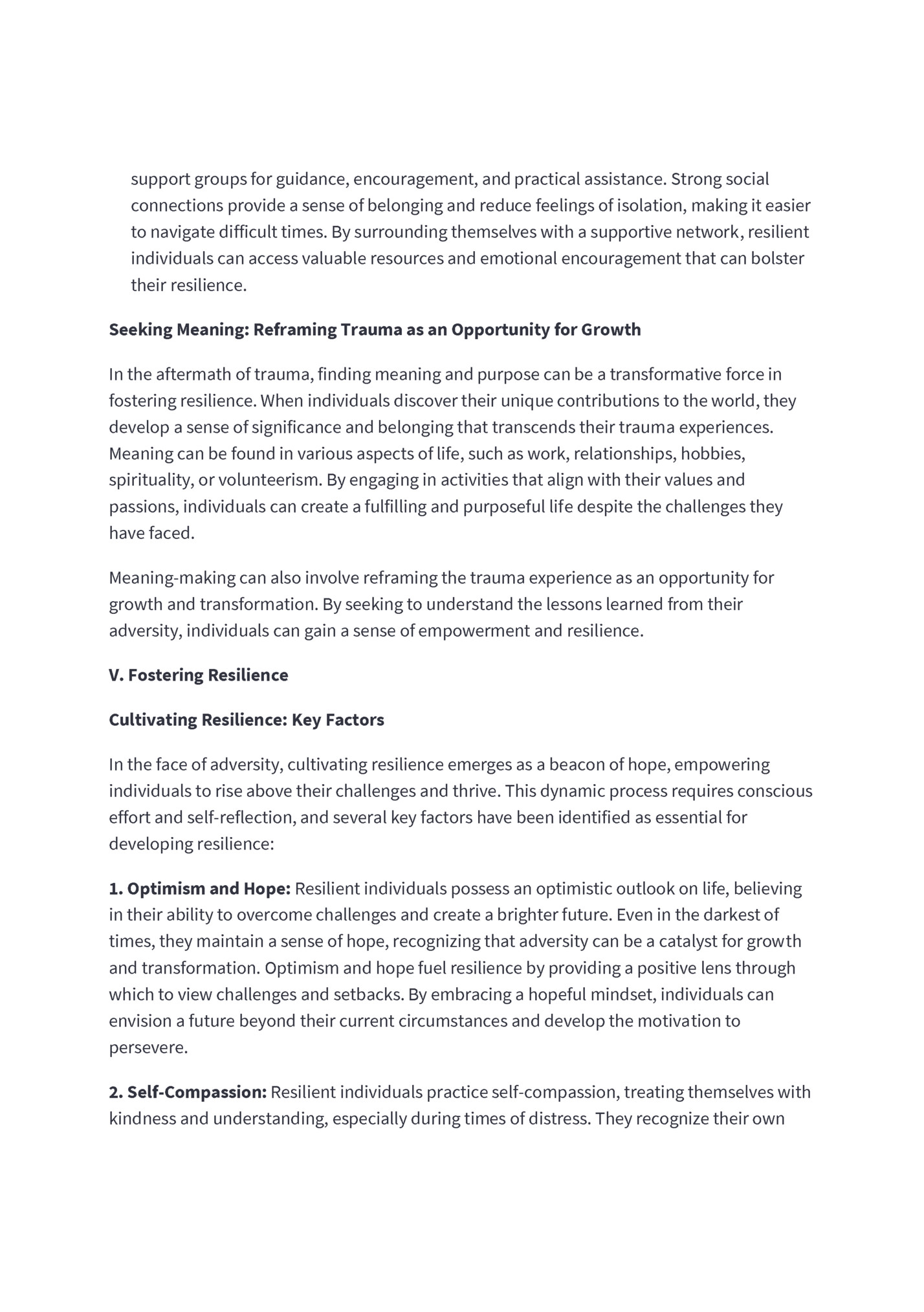
Fleepit Digital © 2021